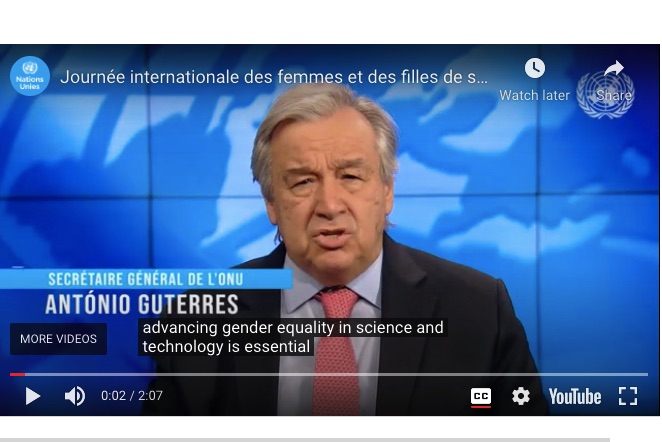. WOMEN’S EQUALITY .
An article from United Nations News
Closed labs and increased care responsibilities are just a two of the challenges women in scientific fields are facing during the COVID-19 pandemic, the UN chief said in his message for the International Day of Women and Girls in Science, on Thursday.

Video made by the Secretary-General
“Advancing gender equality in science and technology is essential for building a better future”, Secretary-General António Guterres stated, “We have seen this yet again in the fight against COVID-19”.
Women, who represent 70 per cent of all healthcare workers, have been among those most affected by the pandemic and those leading the response to it. Yet, as women bear the brunt of school closures and working from home, gender inequalities have increased dramatically over the past year.
Woman’s place is in the lab
Citing the UN Educational, Scientific and Cultural Organization (UNESCO) he said that women account for only one third of the world’s researchers and hold fewer senior positions than men at top universities, which has led to “a lower publication rate, less visibility, less recognition and, critically, less funding”.
Meanwhile, artificial intelligence (AI) and machine learning replicate existing biases.
“Women and girls belong in science”, stressed the Secretary-General. Yet stereotypes have steered them away from science-related fields.
Diversity fosters innovation
The UN chief underscored the need to recognize that “greater diversity fosters greater innovation”.
“Without more women in STEM [science, technology, engineering and mathematics], the world will continue to be designed by and for men, and the potential of girls and women will remain untapped”, he spelled out.
Their presence is also critical in achieving the Sustainable Development Goals (SDGs), to close gender pay gaps and boost women’s earnings by $299 billion over the next ten years, according to Mr. Guterres.
“STEM skills are also crucial in closing the global Internet user gap”, he said, urging everyone to “end gender discrimination, and ensure that all women and girls fulfill their potential and are an integral part in building a better world for all”.
(continued in right column)
(Click here for a French version of this article or here for a Spanish version.)
Does the UN advance equality for women?
Prospects for progress in women’s equality, what are the short and long term prospects?
(continued from left column)
‘A place in science’
Meanwhile, despite a shortage of skills in most of the technological fields driving the Fourth Industrial Revolution, women still account for only 28 per cent of engineering graduates and 40 per cent of graduates in computer science and informatics, according to UNESCO.
It argues the need for women to be a part of the digital economy to “prevent Industry 4.0 from perpetuating traditional gender biases”.
UNESCO chief Audrey Azoulay observed that “even today, in the 21st century, women and girls are being sidelined in science-related fields due to their gender”.
As the impact of AI on societal priorities continues to grow, the underrepresentation of women’s contribution to research and development means that their needs and perspectives are likely to be overlooked in the design of products that impact our daily lives, such as smartphone applications.
“Women need to know that they have a place in science, technology, engineering and mathematics, and that they have a right to share in scientific progress”, said Ms. Azoulay.
‘Pathway’ to equality
Commemorating the day at a dedicated event, General Assembly President Volkan Bozkir informed that he is working with a newly established Gender Advisory Board to mainstream gender throughout all of the UN’s work, including the field of science.
“We cannot allow the COVID-19 pandemic to derail our plans for equality”, he said, adding that increasing access to science, technology, engineering and mathematics education, for women and girls has emerged as “a pathway to gender equality and as a key objective of the 2030 Agenda for Sustainable Development”.
Mr. Volkan highlighted the need to accelerate efforts and invest in training for girls to “learn and excel in science”.
“From the laboratory to the boardroom, Twitter to television, we must amplify the voices of female scientists”, he stressed.
STEM minorities
Meanwhile, UNESCO and the L’Oréal Foundation honoured five women researchers in the fields of astrophysics, mathematics, chemistry and informatics as part of the 23rd International Prize for Women in Science.
In its newly published global study on gender equality in scientific research, To be smart, the digital revolution will need to be inclusive, UNESCO shows that although the number of women in scientific research has risen to one in three, they remain a minority in mathematics, computer science, engineering and artificial intelligence.
“It is not enough to attract women to a scientific or technological discipline”, said Shamila Nair-Bedouelle, Assistant UNESCO Director-General for Natural Sciences.
“We must also know how to retain them, ensuring that their careers are not strewn with obstacles and that their achievements are recognized and supported by the international scientific community”.